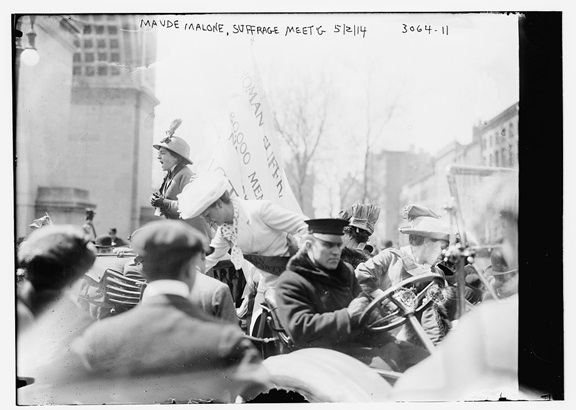By Amanda Moffettone, undergraduate, SUNY Oneonta
Maude Malone was born in 1877 and was the daughter of Edward and Annie Loyola (Flynn) Malone. She organized the Harlem Equal Rights League in 1905. She was also one of the officers of the regular suffrage organization, having headquarters at the Hotel Martha Washington.
Malone later resigned the leadership of this band of militant workers in 1908 at a committee meeting for the Progressive Woman Suffrage Union. She felt the original plan was to invite the cooperation of all sorts and conditions of men and women in the fight for equal rights but instead the union did not hold true to having no prejudice of race, color, difference in class or creed, whether religious or economic.
She was known for being a loud protester who would shout questions during politicians' speeches. One time she shouted during a 1912 meeting at the Brooklyn Academy of Music where Woodrow Wilson was speaking. Malone was arrested and placed in jail for a night. She made it a point to go to every speech given by a presidential candidate in New York City and yell out, "What about votes for women?" Malone insisted that if she were disorderly she should be punished and be able to know just what her rights were.
Her activism continued into the period when the National Woman's Party became a leading actor in the woman suffrage movement. Malone was arrested for picketing the White House in the fall of 1917 and served time in the Occoquan Workhouse in Lorton, Virginia.
Active in the re-invigoration of the women's suffrage movement that occurred in the first two decades of the twentieth century, Malone advocated for the affiliation of library workers with women's organizations and with the working class. She worked at the New York Public Library and "was a founding member of the Library Employees' Union in 1917." She took a broad view of the significance of woman suffrage and once said, "After all it was less a difference in method that was needed than a difference in attitude. Unless suffrage made for democracy it really meant nothing."
Sources:
Quotes are from Joseph Dana Miller, Land and Freedom: An International Record of Single Tax Progress (150 Nassau Street New York City, 1910), 29. "Miss Malone Quits The Suffragettes." New York Times, 27 March 1908, p. 4. "Miss Maud Malone Convicted For Her Heckling of Wilson" The Evening News: Nov. 15, 1912. Ruth Feldman, "Maud Malone Heckles 100 Years Ago." 2012. http://ruthtenzerfeldman.com/2012/11/15/maud-malone-heckles-100-years-ago/ Woman's Who's Who of America: A Biographical Dictionary of Contemporary Women of the United States and Canada, 1914-1915, ed. by John William Leonard (New York, NY: American Commonwealth Company, 1914), 535.
National Park Service, "Maud Malone," accessed online at https://www.nps.gov/people/maud-malone.htm
National Park Service, "Series: Maud Malone—New York City librarian and Suffrage Powerhouse," accessed online at https://www.nps.gov/articles/series.htm?id=3E3CC3C3-D0A5-8EDF-D5C1777A0EB44AA2. Includes 7 online articles.
Dan Meharg, "Maud Malone: Epilogue and Legacy," on National Park Service website, accessed at https://www.nps.gov/articles/maud-malone-epilogue-and-legacy.htm.
Wikipedia sketch of Maud Malone, accessed online at https://en.wikipedia.org/wiki/Maud_Malone.

"Miss Maud Malone Convicted For Her Heckling of Wilson," The Evening News (Nov 15 1912).

https://c1.staticflickr.com/6/5058/5416186200_490cdd7a73_b.jpg
Library of Congress
